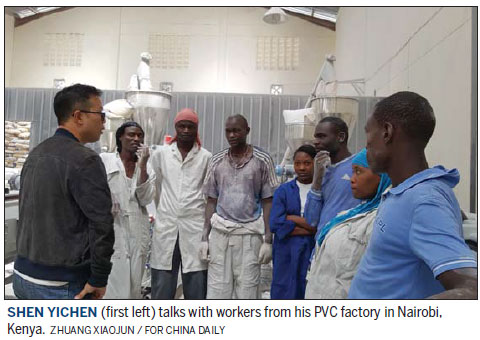Entrepreneur finds the right climate for business
When Shen Yichen arrived in Kenya for the second time from Tanzania in late 2014, he had more confidence in opening new businesses in the country.
Shen is now the managing director of Dexin Building Materials Co, the only Chinese producer of PVC pipes in Nairobi.
Shen started to explore the Africa market in Tanga, Tanzania in 2006 with an investment of 10 million yuan ($1.5 million) to produce gypsum board. The company, formally registered in Tanzania in accordance to the law of the country, grew into a big company with 400 acres of licensed gypsum mine and 15 trucks within a few years. It was the only gypsum producer at the time among the five countries in East Africa.
Shen eventually joined hands with a friend in Kenya for the first time to operate a company in the same industry, but sold it to his partner in 2013.
In mid-2014, he decided to sell his Tanzanian company and concentrated on the business in Kenya. Upon returning to Kenya at the end of 2014 for the second time, he started his Dexin company.
The frequent visits to and business operations in Tanzania and Kenya gave him opportunities to understand and compare the markets of the two countries.
"I chose to invest in Kenya because, after many years, I find that Kenya has a better business environment compared with its neighboring countries," Shen says. "Kenya has improved and matured its legal system and its people are well-educated. They speak English and are willing to work to earn their reasonable pay."
He said he believes if one is familiar with the market rules in Kenya, he or she will be sure to succeed, given they have enough funds to run a business.
Shen studied computer science at the university in his hometown in Zhejiang province in East China. His father was a civil engineer and had sub-contracted some road construction projects in China. He was greatly influenced by his father, who encouraged him to run his own business instead of being an office worker.
"That is why I began my business in Tanzania after working in my father's company for two years," he says.
Since his return to Kenya in 2015, he has set up his own business empire that is engaged in three sectors: PVC pipes, hot-dipped galvanized steel and gypsum finishing products. He set a goal to add one product each year once the existing products established a market.
He is considering producing reinforced fiberglass this year.
Although the scale of the company is not big. It now employs 70 local workers and works with equipment imported from China.
"I order the most advanced equipment of the sector, shipping it to Kenya and taking steps to localize the products," he said, adding that the gypsum powder is imported from the Middle East.
He aims to build Dexin into a multi-business industrial enterprise for construction and engineering raw materials. Its products are now widely used in many civil engineering projects, including Nairobi Hospital, University of Nairobi, University of Kenyatta, the Jomo Kenyatta International Airport projects and the Mombasa-Nairobi standard gauge railway project.
As a newcomer to the Kenya market, the company has remained strict with the quality of its products while exploring the market over the past three years. It organized technical training for local staff members and achieved considerable progress.
"Unlike the Chinese construction market in its early stages in which most buildings were blank, Kenyan buildings are furnished," Shen said. "I am confident about market prospects."
Among the employees of the company, between 50 and 60 percent are Indians and between 30 and 40 percent are local people.
panzhongming@chinadaily.com.cn



















